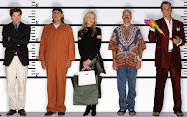
My reflections on last night's mind-blowingly awesome episode of BSG will come later today. For now, Mo Ryan has an interview with "Bloods on the Scale" writer Michael Angeli:
Why did Gaeta insist on a "trial" of Adama? Was it because he wanted to hang on to the idea that this coup was a legitimate transfer of power? Was it because he needed to hear Adama to say that Adama was wrong? What was that about?
For whatever else he was (or might’ve been) Gaeta was an idealist and despite his near occasions of peevishness, he was a romantic. He believed in the idea of government, laws, leadership, service, etc. and if you look at his behavior away back on New Caprica, there was a certain nobleness to his intentions. He wanted to do things right, he was an advocate of justice, fairness.
So, it’s not surprising that even with a coup snowballing, he’d want some form of a trial. But more importantly, Gaeta was conflicted. He loved Adama and just couldn’t get around to killing him. Gaeta was the romantic; Zarek was the realist. For Gaeta, the “trial,” was a stall. And having Adama admit that he was wrong was really about Gaeta convincing his own intellect that Adama should die – because he, himself admits he’s wrong.
Were you channeling Winston Churchill when you wrote Laura's "I'm coming for all of you" speech? What did you draw on for that dialogue?
[Executive producer] Ronnie [Moore]. He told me to bring Laura to a breaking point. So I had Zarek just becoming this terrible liar/bearer of bad news, pulling out all the stops, telling Adama that Tigh’s been shot dead escaping when Tigh was very alive and at large, telling Laura that Adama had been executed (and Zarek assumed that he actually was), all of it building to a point where Laura’s either gonna collapse in a pile or come out swinging.
What worked in our favor was the fact that, because of scheduling problems, we had to shoot this scene after a long day and everyone was exhausted. Mary had been traveling all day, flying back from Europe. We thought she’d be wasted, but she was still on London Time or something and she just rocked everybody’s headsets off. Everyone was clapping after the take, going wild.
That scene near the end between Baltar and Gaeta -- why put those two characters together? What were your reasons for including that scene?
Oh, I think Gaeta and Baltar were so close and had so much history together, it just seemed so right. The scene serves a couple of purposes. First and foremost, it humanizes Gaeta once again. We see the Gaeta we always loved and enjoyed. And it gives Baltar some emotional honesty. It’s obvious that his heart is breaking for Gaeta. And it’s obvious because both James [Callis, who plays Baltar] and AJ [Alessandro Juliani, who plays Gaeta] just killed on that scene, they’re both so frakking good.
I watched the show at Mark Sheppard’s house with some people and Liz Nankin ([director] Michael Nankin’s wife) brought up a really good point, which was that we’re killing off one of our oldest, and to some, one of our most revered characters, and it gives the audience a chance to legitimately say good-bye.
The scene is kind of wicked, too. We’re supposed to believe that Gaeta’s been spared. It takes place in Gaeta’s quarters (Ron’s idea). And Gaeta speaks of himself in the present tense, how he wants people to know who he is, or something to that effect.
Does the title "Blood on the Scales" come from a work of literature? Or was it a title you came up with? Either way, can you talk a little about that title?
I’m sure I was influenced by the title of Bob Dylan’s “Blood on the Tracks” album and the whole “Watchtower” tie-in. But thematically, it was an oblique signature of Gaeta’s fate and his conundrum. He starts out as the good soldier/idealist, becomes disillusioned (even stabs his hero, Baltar, with a pen), then the loss of his leg colors his perception of Kara and the Cylons. His embitterment eventually grows its own limb – the mutiny. He wants to do the right thing but the, er, scales of justice are tipped not only by the bloodshed of innocent people, but by Gaeta unable to silence his own humanity (his love for Adama), the blood running through his veins, etc.
Why did Baltar have a vision of Adama's execution -- was he psychic or just having a bad dream based on what had been happening?
A lot of Baltar’s story on the base ship didn’t make the cut. Baltar has some deep, underlying guilt for running away -- from his congregation (in the previous episode), from danger, etc. He meets another beautiful Six (Lida) who mistakes his moodiness for injury. She wants to help him feel better and all of it plays on his psyche, which causes the nightmare – which compels him to want to go back to Galactica and face everything.
















.jpg)

